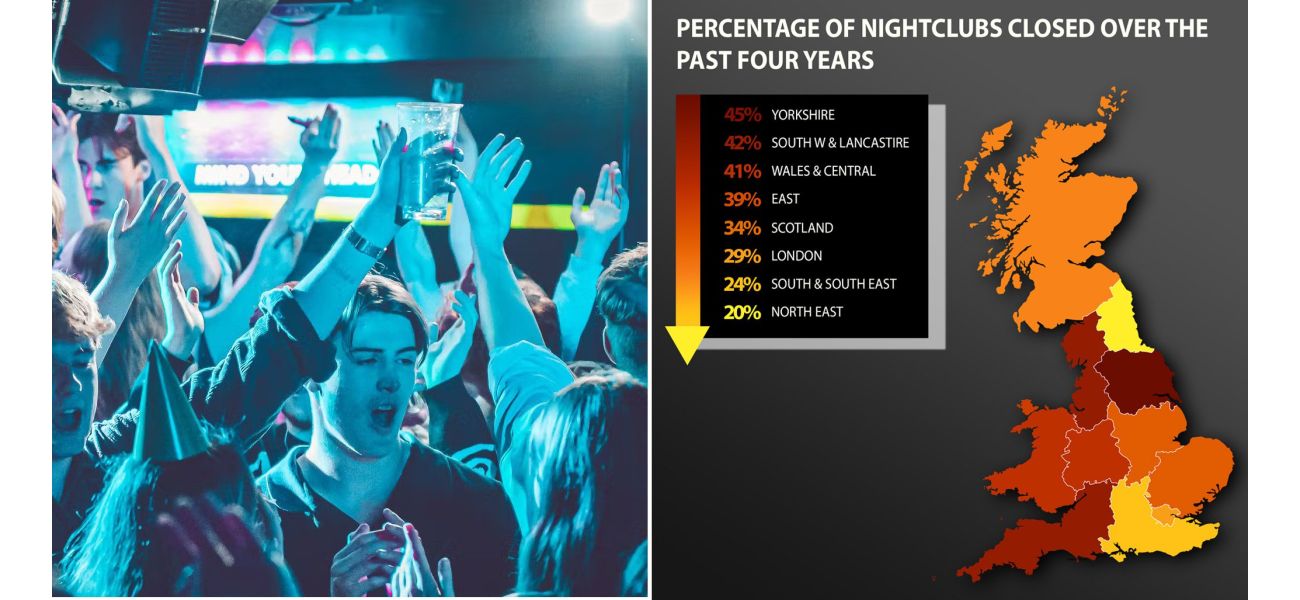A map displays the regions in the UK most affected by the closure of almost 500 nightclubs over the past four years.
In the last five years, nearly 500 nightclubs in the UK have shut down.
October 19th 2024.

In the past four years, almost 500 nightclubs in the UK have closed their doors permanently. This week, one of London's most famous clubs, Tiger Tiger by Piccadilly Circus, joined the list of closures. The news came just weeks after the Night Time Industry Association released statistics showing the decline of 480 clubs in the country. The association emphasized the devastating impact on the night-time economy and called for urgent support and intervention.
The decline in dance music spaces, which the association refers to as the "lifeblood of the scene," has been particularly hard hit. According to CGA Neilson's data, there has been an average of 10 club closures per month from June 2020 to June 2024. What's even more concerning is that the pace of closures has increased this year, with 65 clubs shutting down between December 2023 and June 2024, equating to 11 closures per month.
The map shows the hardest hit region over the past four years is Yorkshire, with a 45% decrease in the number of venues from 132 to just 73. London's Tiger Tiger club was also among the recent closures. Following Yorkshire, Lancashire and the south west saw a 42% drop, with Lancashire losing 178 clubs and the south west losing 111 clubs. Wales also suffered a 41% decline, with 66 venues closing down.
In contrast, the north east had the lowest drop of 20%, but their overall number of clubs was already small. They lost 12 venues, leaving the area with a total of 49. Percentage-wise, London experienced a relatively low decline of 29%, going from 200 to 143 clubs. However, this still equates to 57 closures over the course of four years, and this figure does not include Tiger Tiger, which shut down after the statistics were released.
The highest percentage of closures was in Yorkshire, while the north east saw the lowest number of closures. The number of nightclub closures by region from June 2020 to June 2024 are as follows: South & South East: from 92 to 70, South West: 111 to 64, London: 200 to 143, Central Region: 200 to 118, East: 67 to 41, Wales: 66 to 39, Lancashire: 178 to 104, Yorkshire: 132 to 73, North East: 61 to 49, and Scotland: 125 to 83.
NTIA CEO Michael Kill attributed the rapid closure of clubs to rising costs, lack of essential public services, and red tape around licensing and planning. He highlighted the unreliability of late-night transport, scarce police presence, and the burden of security and cleaning costs on venues. He also pointed out the inconsistency and hindrance of bureaucratic systems around licensing and planning. Kill stressed the importance of the nightlife sector in creating jobs, supporting tourism, and contributing to the hospitality industry.
He also emphasized that these clubs are not just places to dance, but they are vital spaces for community and creativity. The CEO called for immediate government intervention and expressed concern that long-term reform may not matter if there are no venues left to benefit from it. The Metro reached out to the Department of Business and Trade for comment on the matter.
In more positive news, it was announced last month that Printworks, one of London's iconic techno nightclubs, is set to make a comeback. The venue, located in Canada Water, closed in 2023 after a redevelopment plan was approved by Southwark Council to turn the building into office space. However, the NTIA recently shared on Instagram that Printworks will be reopening. The exact date is still unclear, but the club's website hints at a possible return in 2026.
In conclusion, the past four years have seen a significant decline in the number of nightclubs in the UK, with many iconic venues being forced to shut down permanently. The industry is calling for urgent support and intervention from the government to save these vital spaces for the community and creativity. Although there are some positive developments, such as the potential return of Printworks, the overall situation remains concerning. We must continue to support the nightlife sector to ensure its survival and contribution to the economy.
The decline in dance music spaces, which the association refers to as the "lifeblood of the scene," has been particularly hard hit. According to CGA Neilson's data, there has been an average of 10 club closures per month from June 2020 to June 2024. What's even more concerning is that the pace of closures has increased this year, with 65 clubs shutting down between December 2023 and June 2024, equating to 11 closures per month.
The map shows the hardest hit region over the past four years is Yorkshire, with a 45% decrease in the number of venues from 132 to just 73. London's Tiger Tiger club was also among the recent closures. Following Yorkshire, Lancashire and the south west saw a 42% drop, with Lancashire losing 178 clubs and the south west losing 111 clubs. Wales also suffered a 41% decline, with 66 venues closing down.
In contrast, the north east had the lowest drop of 20%, but their overall number of clubs was already small. They lost 12 venues, leaving the area with a total of 49. Percentage-wise, London experienced a relatively low decline of 29%, going from 200 to 143 clubs. However, this still equates to 57 closures over the course of four years, and this figure does not include Tiger Tiger, which shut down after the statistics were released.
The highest percentage of closures was in Yorkshire, while the north east saw the lowest number of closures. The number of nightclub closures by region from June 2020 to June 2024 are as follows: South & South East: from 92 to 70, South West: 111 to 64, London: 200 to 143, Central Region: 200 to 118, East: 67 to 41, Wales: 66 to 39, Lancashire: 178 to 104, Yorkshire: 132 to 73, North East: 61 to 49, and Scotland: 125 to 83.
NTIA CEO Michael Kill attributed the rapid closure of clubs to rising costs, lack of essential public services, and red tape around licensing and planning. He highlighted the unreliability of late-night transport, scarce police presence, and the burden of security and cleaning costs on venues. He also pointed out the inconsistency and hindrance of bureaucratic systems around licensing and planning. Kill stressed the importance of the nightlife sector in creating jobs, supporting tourism, and contributing to the hospitality industry.
He also emphasized that these clubs are not just places to dance, but they are vital spaces for community and creativity. The CEO called for immediate government intervention and expressed concern that long-term reform may not matter if there are no venues left to benefit from it. The Metro reached out to the Department of Business and Trade for comment on the matter.
In more positive news, it was announced last month that Printworks, one of London's iconic techno nightclubs, is set to make a comeback. The venue, located in Canada Water, closed in 2023 after a redevelopment plan was approved by Southwark Council to turn the building into office space. However, the NTIA recently shared on Instagram that Printworks will be reopening. The exact date is still unclear, but the club's website hints at a possible return in 2026.
In conclusion, the past four years have seen a significant decline in the number of nightclubs in the UK, with many iconic venues being forced to shut down permanently. The industry is calling for urgent support and intervention from the government to save these vital spaces for the community and creativity. Although there are some positive developments, such as the potential return of Printworks, the overall situation remains concerning. We must continue to support the nightlife sector to ensure its survival and contribution to the economy.
[This article has been trending online recently and has been generated with AI. Your feed is customized.]
[Generative AI is experimental.]
0
0
Submit Comment





